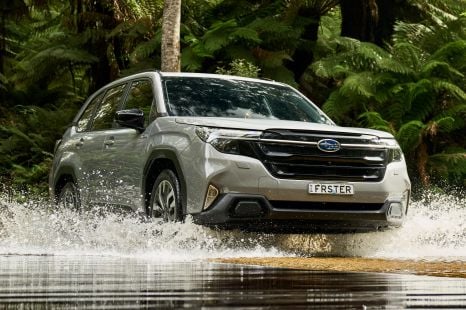

Max Davies
4 Days Ago
The Kia Niro is a comfortable and cute crossover, but at over $70,000 it's up against some tough competition.
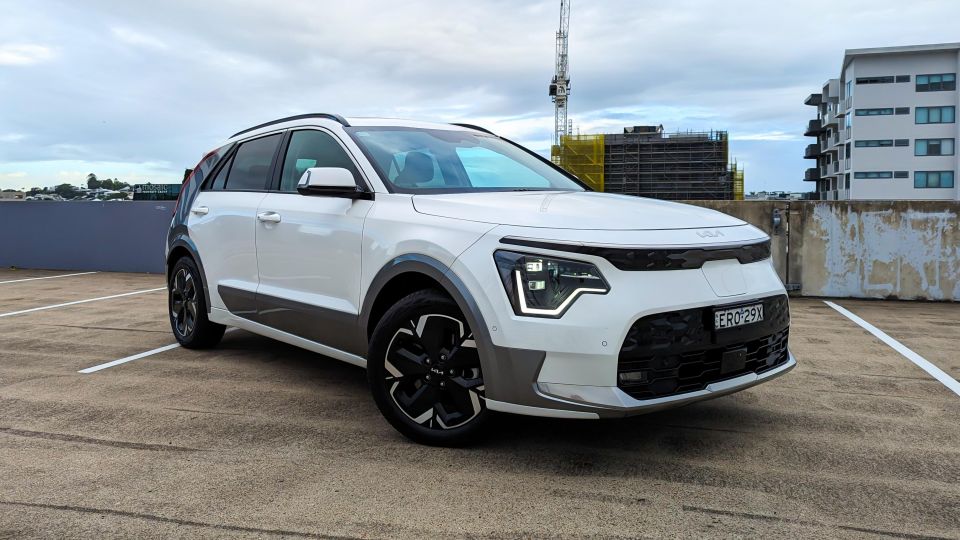
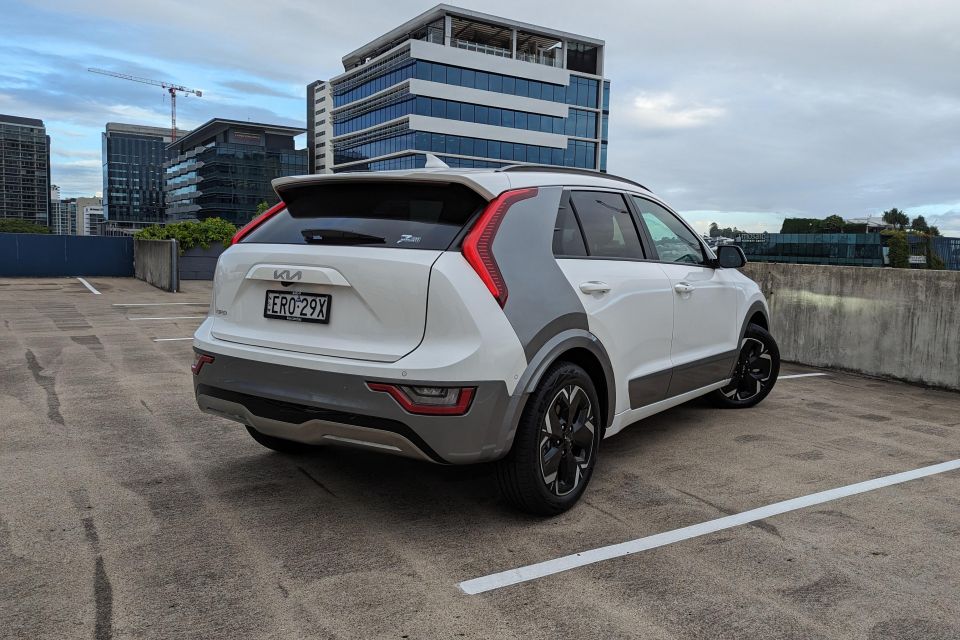

Quickly see how this car stacks up against its competition. Select any benchmark to see more details.
Take advantage of Australia's BIGGEST new car website to find a great deal on a Kia Niro.
The Kia Niro is about to get seriously upstaged.

The new Kia EV5 is set to romp into the Niro’s turf with a bolder design and much stronger supply out of China.
In fact, Kia expects to be able to bring in up to 850 EV5s each month, which could see it sell 10,200 examples annually. The company sold just 1000 Niro EVs in 2023.
We haven’t driven the EV5 yet, so we can’t say for sure if it’s the better car. We also don’t yet know how much it will cost.
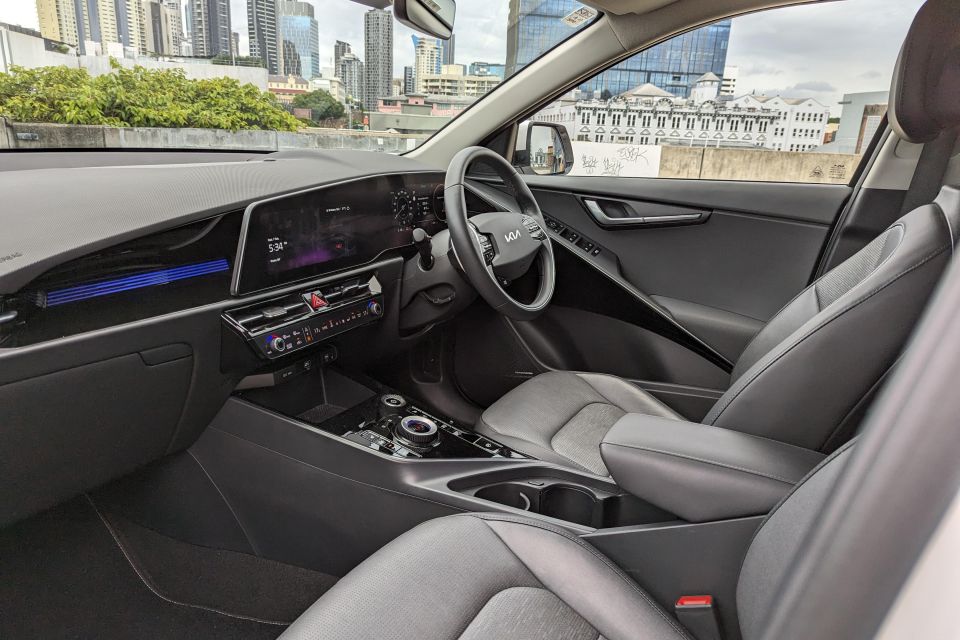
Nevertheless, the Niro is in danger of becoming even more overlooked than it already is.
Should this electric wallflower be on your shortlist?
We’ve put the Niro EV GT-Line to the test, which is the priciest member of the Niro range at almost $10,000 more than the larger Tesla Model Y RWD and around $4000 more than the related Hyundai Kona Electric Premium Extended Range.
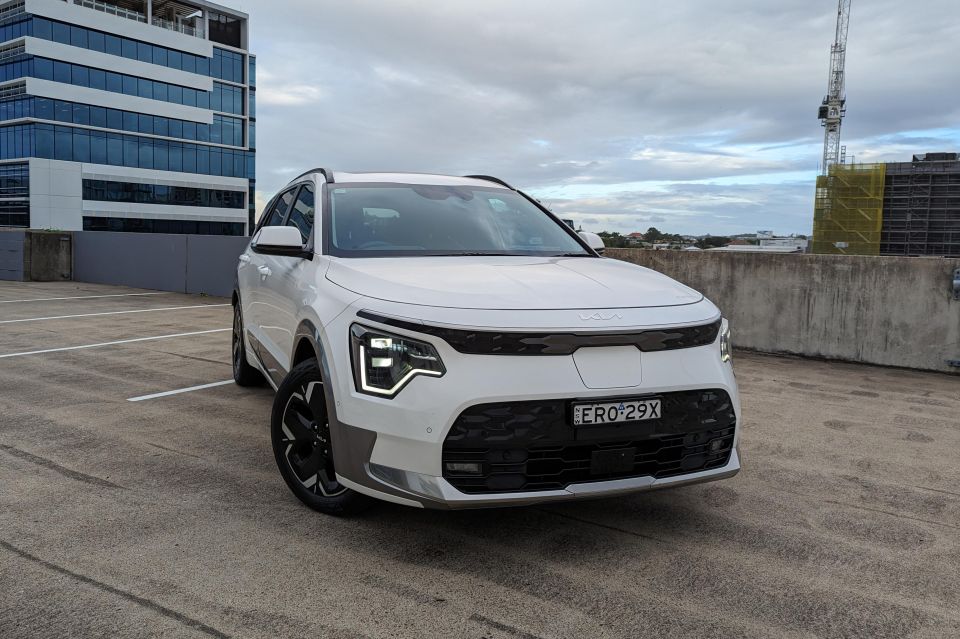
Based on a Sydney postcode, you’re looking at a drive-away price tag of $78,282. Add another $520 for premium paint.
The Niro EV GT-Line’s price tag makes it ineligible for Queensland EV incentives.
2024 Kia Niro pricing
All prices exclude on-road costs.
To see how the Kia Niro lines up against its rivals, check out our comparison tool.
The angular lines of the Niro’s exterior continue inside the cabin, most notably on the door panels.
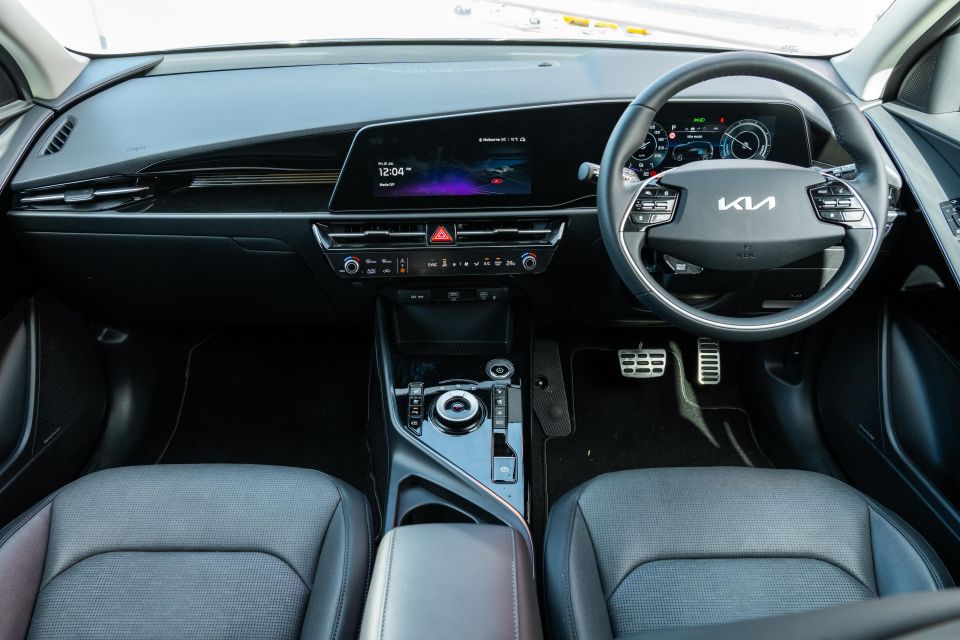
There’s also a neat alcove in the dashboard with ambient light elements.
Kia has sacrificed functionality somewhat for the sake of style. The dramatically angled front door trims have giant slabs of gloss black trim, while their ledges are too narrow to comfortably rest your arm.
The abundance of gloss black trim carries through to the centre console, which is almost entirely finished in the smudge-, dust- and scratch-prone material.
Other material choices are better. The dash top is finished in a relatively soft-touch material with a textured finish, for example.
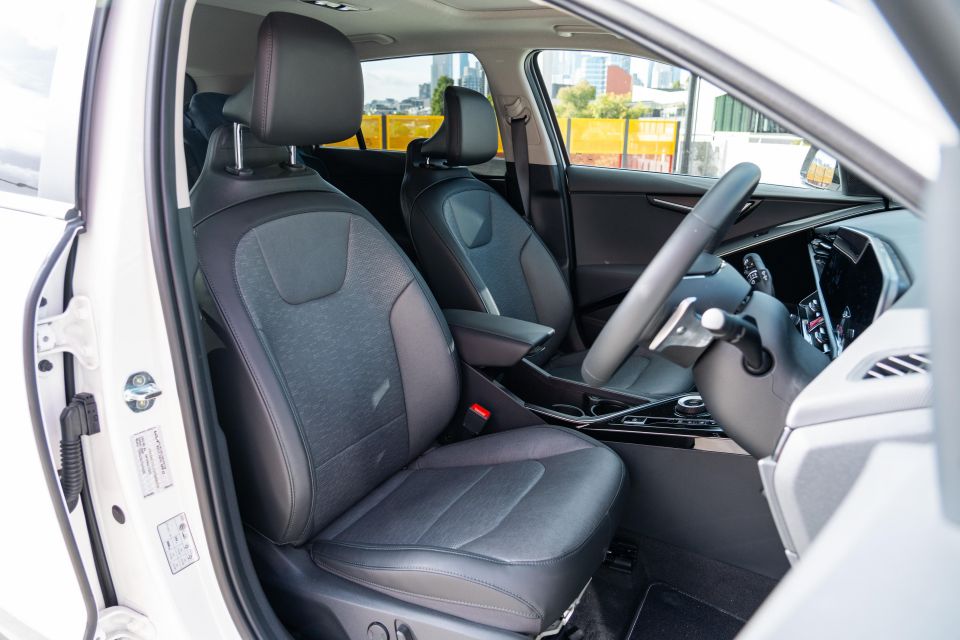
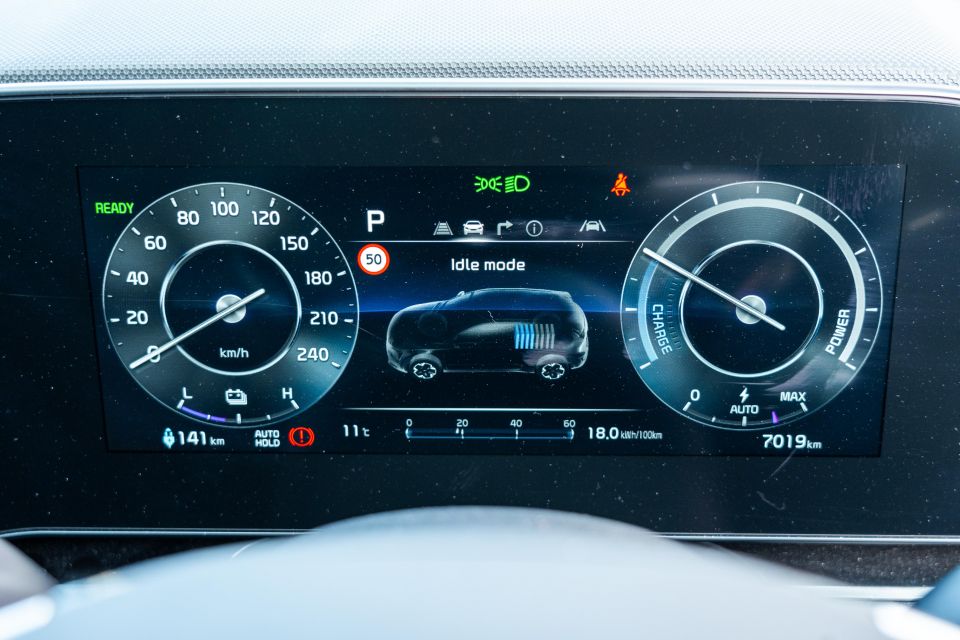
The 10.25-inch infotainment touchscreen has the modern graphics and logical interface expected of a Kia screen in 2024, but the screen itself is wide yet short in stature.
Oddly, Android Auto doesn’t take up the full screen. It, along with Apple CarPlay, also still requires a cord to connect. It’s a USB-A outlet too, though there’s a separate USB-C outlet for charging devices up front.
There’s a handy EV menu, which also includes a graphical representation of your remaining range – both with and without air-conditioning on – plus your nearest charge stop.
The digital instrument cluster has attractive graphics too, though there’s no map view available as you’ll find in some rival brands.
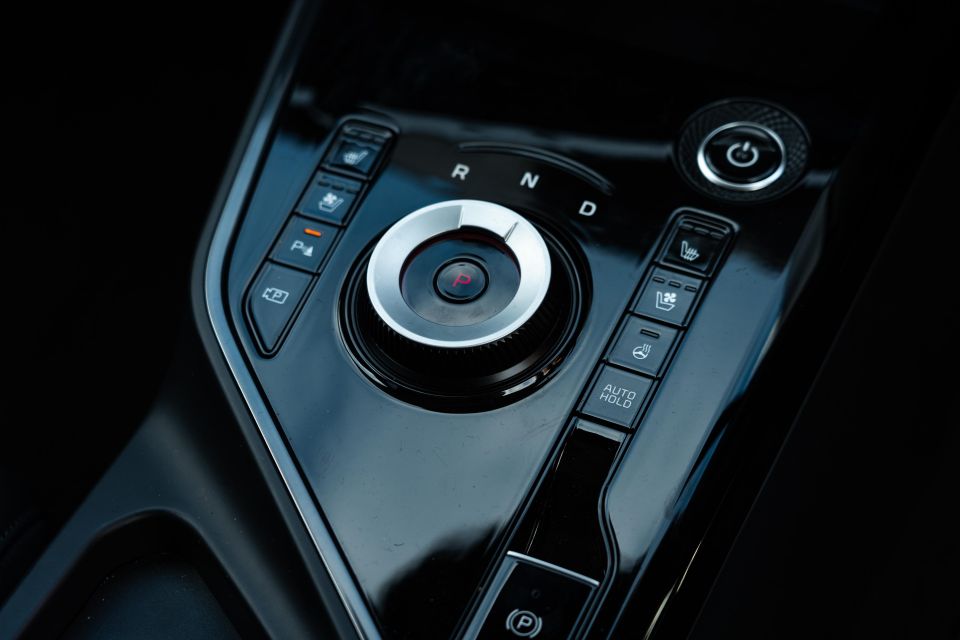
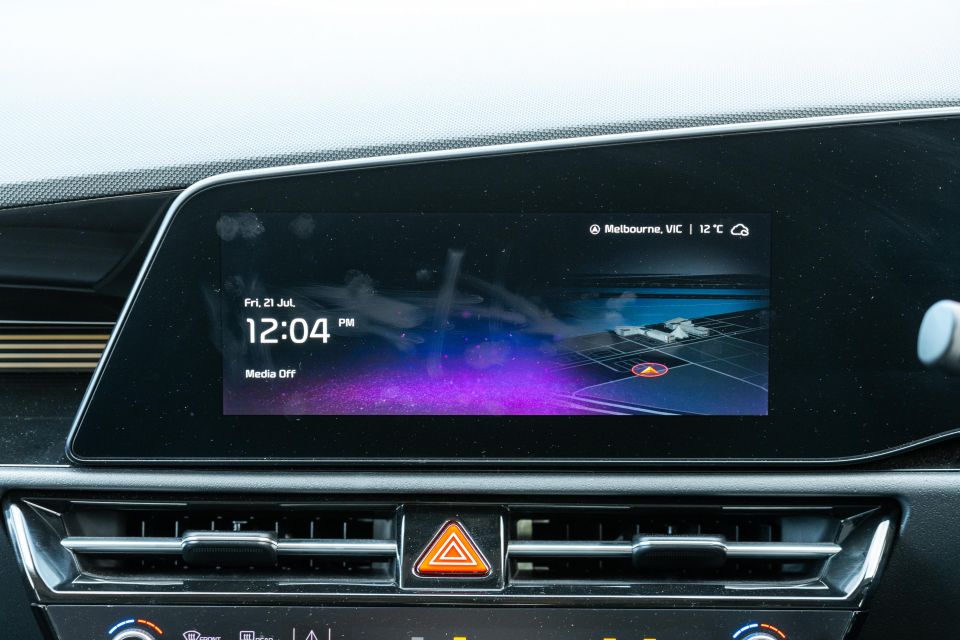
The Harman Kardon sound system is excellent, but there are some unusual feature omissions for a top-spec Kia at this price point. You get the brand’s handy Remote Smart Park Assist, but there’s no surround-view camera like you can find on vehicles costing thousands less.
The Remote Smart Park Assist, if you’re unfamiliar with the feature, allows you to move the vehicle forward and back from outside – handy if some rude individual has parked too closely to your door, or if you have a tight garage. It sounds like a gimmick, but it came in handy for me on at least a couple of occasions. It’s also a fun party trick.
The rotary dial for gear selection is tactile, and the touch-capacitive climate/media control panel – as seen in other Kias like the Sportage – is simple to use and features a pair of knobs.
A wireless charging pad sits at the base on the centre stack, while on the centre console there’s an open storage area with retractable cupholders. The enclosed centre console bin, however, is on the small side.
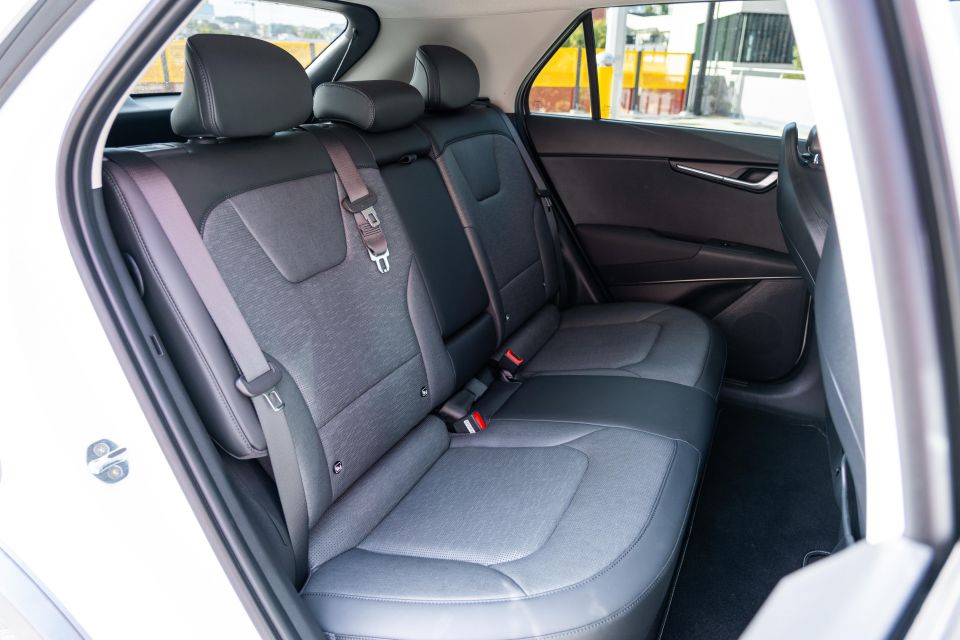
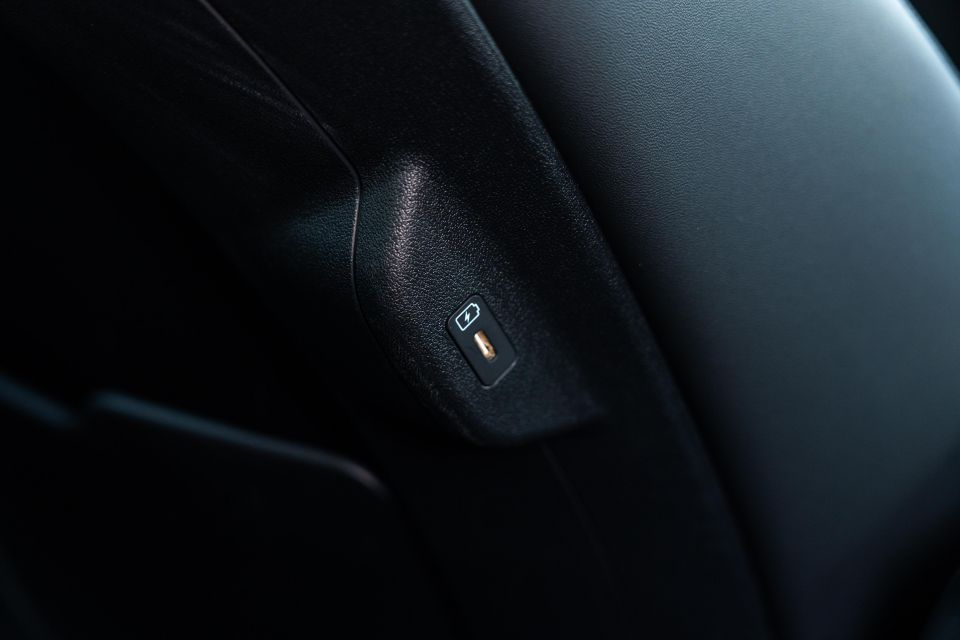
In terms of other storage, there’s a decently sized glove compartment plus bottle holders in the doors.
Everything feels screwed together well, though the doors don’t close with as solid a thunk as I’d expect.
Step into the back and there’s a comfortable rear bench and plenty of headroom and legroom. At 180cm tall, I could sit in the slightly higher, firmer centre seat and my head still didn’t touch the roof.
We’ve previously fit three adult males abreast in a Niro Hybrid for a trip to the airport with minimal grumbling, so the cabin is decently wide, too. Toe room, however, is a bit tight in the Niro EV, though the floor is flat which is unusual for an EV on a combustion-engine platform.
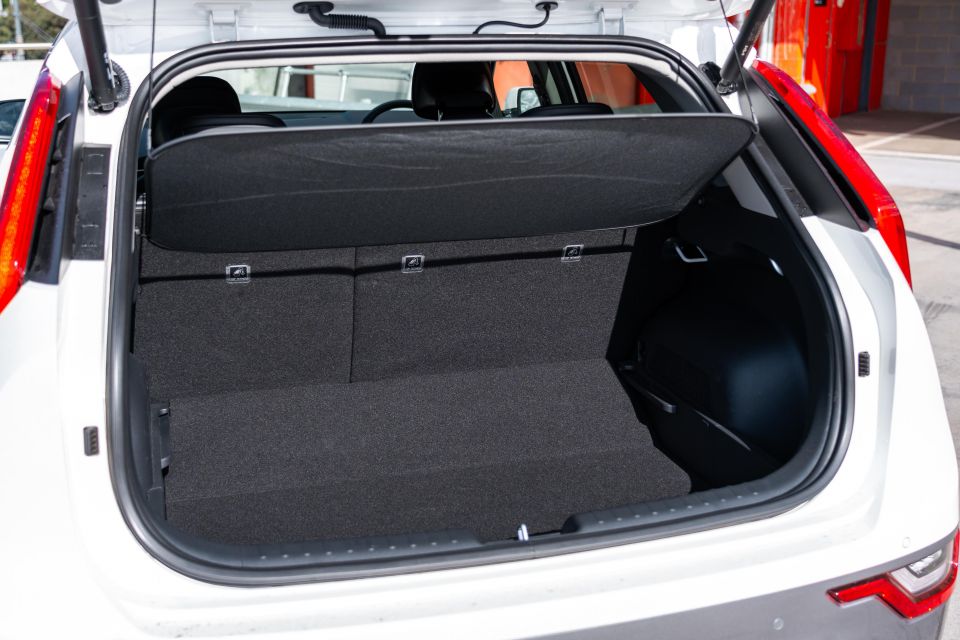
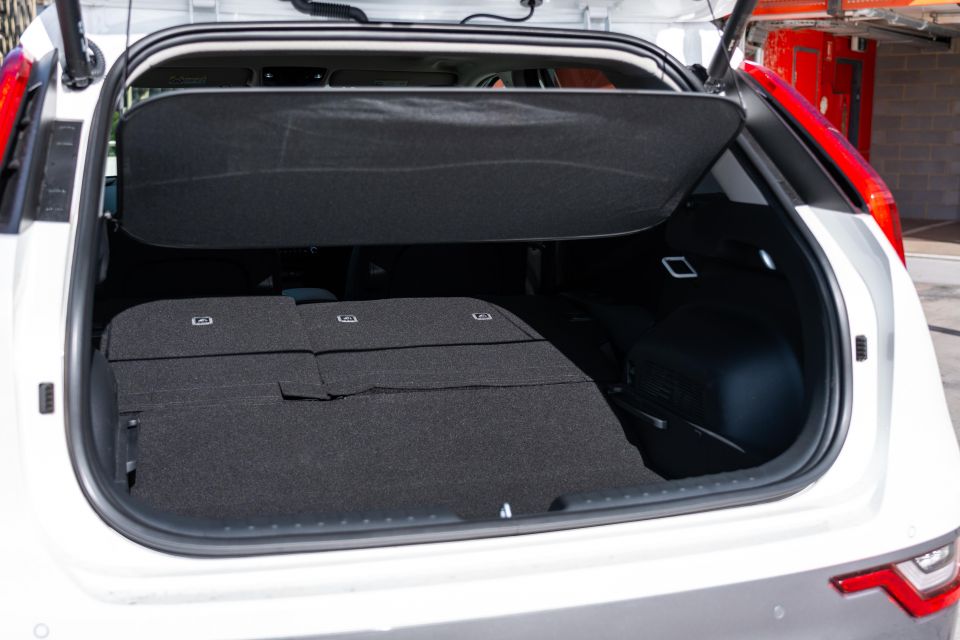
There’s a USB-C outlet in each front seatback, plus a vehicle-to-load (V2L) outlet at the rear of the centre console.
The latter allows you to power external appliances with a conventional three-prong plug at up to 3.6kW; there’s also an external V2L outlet which you can plug appliances into with an adaptor. There are also three top-tether and two ISOFIX anchor points for child seats.
Visibility out the back is average thanks to a chunky C/D-pillar and a slim rear window. The Niro also has quite a high belt line, so the cabin isn’t as airy as it could be.
Open the powered tailgate and there’s a decent 475L of cargo space, expanding to 1392L with the rear seats folded. There’s also a small cavity under the bonnet for extra storage.
There’s just one powertrain available in the Niro EV range. If you don’t want pure electric power, Kia also offers the Niro with a hybrid powertrain in Australia.
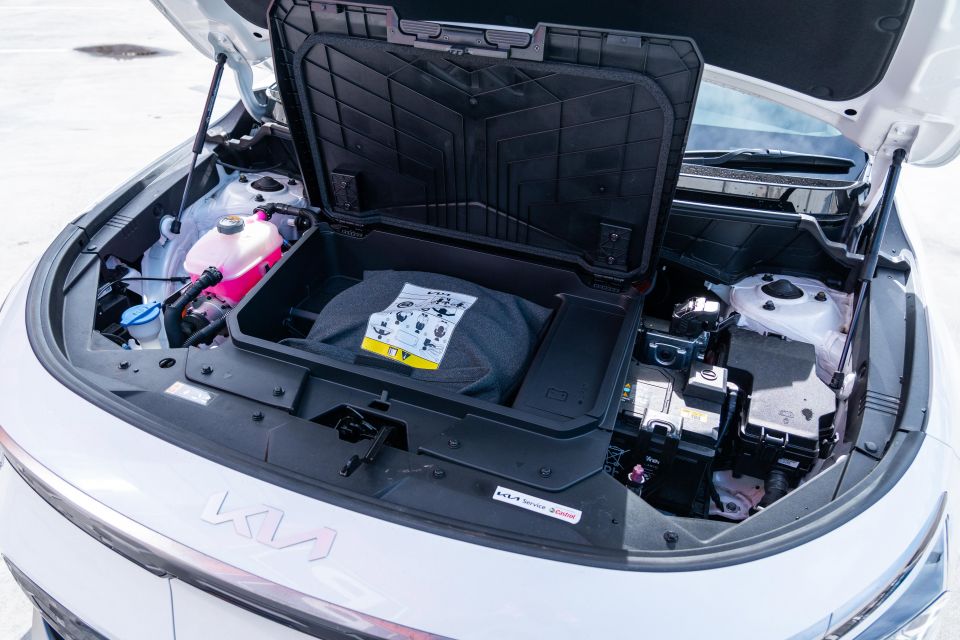
| Model | Niro EV GT-Line |
|---|---|
| Drivetrain | Single-motor electric drive |
| System power | 150kW |
| System torque | 255Nm |
| Driven wheels | Front-wheel drive |
| Battery | 64.8kWh lithium-ion (358V) |
| 0-100km/h | 7.8 seconds |
| Claimed range | 460km (WLTP) |
| Energy consumption (claimed) | 16.2kWh/100km |
| Energy consumption (as tested) | 16kWh/100km (300km mixed driving) |
| Charging capacity (DC) | 85kW |
| DC charge time (10-80 per cent) | 43 minutes |
| Weight | 1727kg (tare) |
To see how the Niro lines up against the competition, check out our comparison tool.
The Niro is broadly competent without being exceptionally memorable to drive.
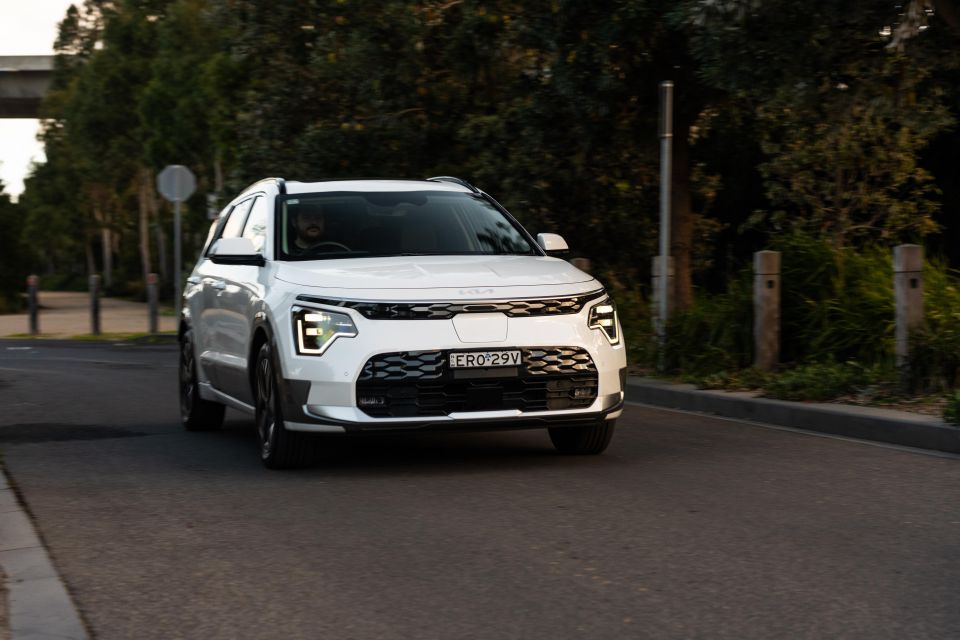
Let’s get the not-so-nice stuff out of the way. The steering is oddly heavy, without being particularly communicative.
It doesn’t lighten up much at low speeds, with an unusual amount of resistance, which makes the Niro less manageable in a parking lot than, say, the larger EV6. We also observed an annoying delay with the reversing camera.
The ride can get a little bit unsettled on particularly patchy road surfaces, with the weight of the 443kg battery noticeable. For the most part however, the Niro rides comfortably, absorbing impacts adeptly.
The Niro is quick off the line without feeling overwhelming, with little in the way of torque steer. Sport mode makes it feel a bit more sprightly, but you’re never really left wanting when it comes to performance.
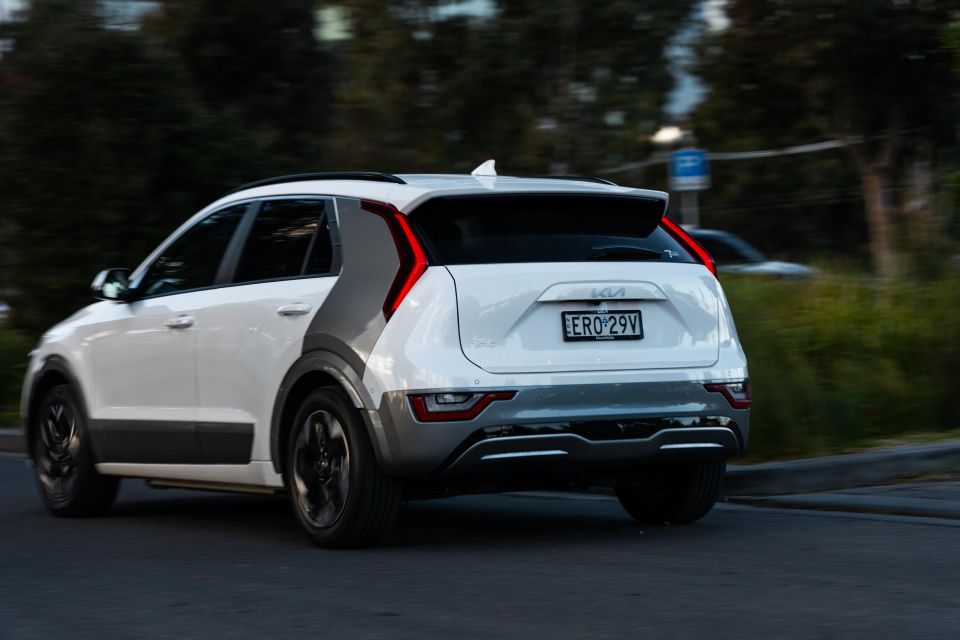
The heavy battery placed under the cabin results in a low centre of gravity, and the Niro feels solid and planted. Handling is safe and predictable.
The cabin is quiet, even on coarse-chip roads or at highway speeds. Little in the way of wind and tyre noise gets into the cabin.
There’s a one-pedal drive mode, but you’ll need to activate this each time you start the vehicle by pulling one of the paddles. The car will, however, remember your auto-hold setting.
If you’re new to the world of EVs, you may find the one-pedal drive mode daunting at first but you quickly get used to it. Otherwise, you can toggle it to have as little regenerative braking as possible, making this feel more like a very quiet Seltos.
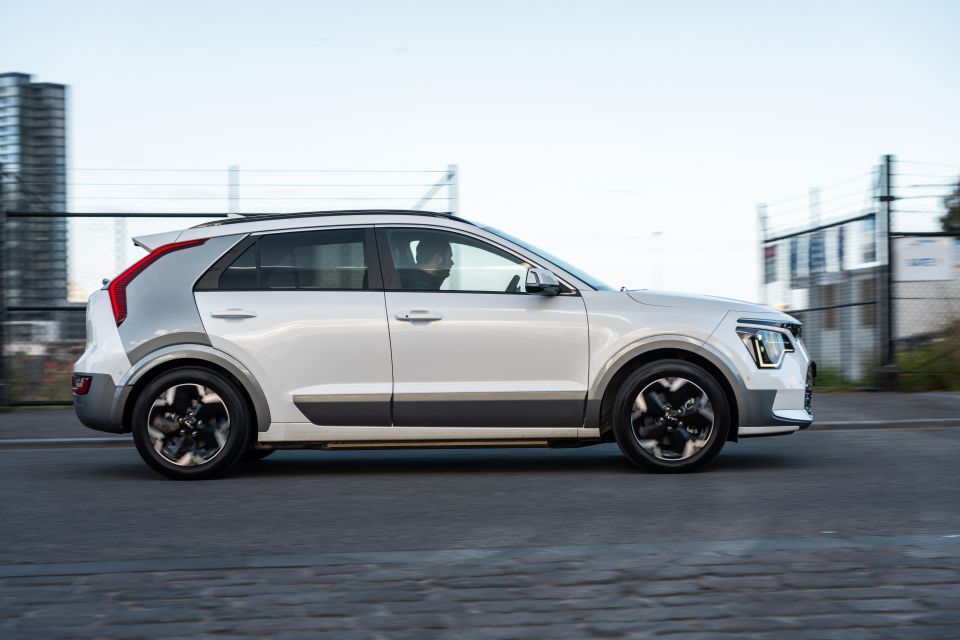
In terms of charging, there’s battery pre-conditioning. As expected, you can also set AC and DC charge limits.
With 460km of WLTP range, it’s essentially lineball with the base Tesla Model Y RWD which has 455km… but costs around $10,000 less.
The Niro’s suite of active safety and driver assist features work without drama. We particularly like how the blind-spot feature will actively intervene instead of simply sounding a chime when it detects danger; it will also vibrate the steering wheel.
The red light/speed camera alert feature proved annoying, however.
The GT-Line sits above the base S in the two-model Niro EV range.
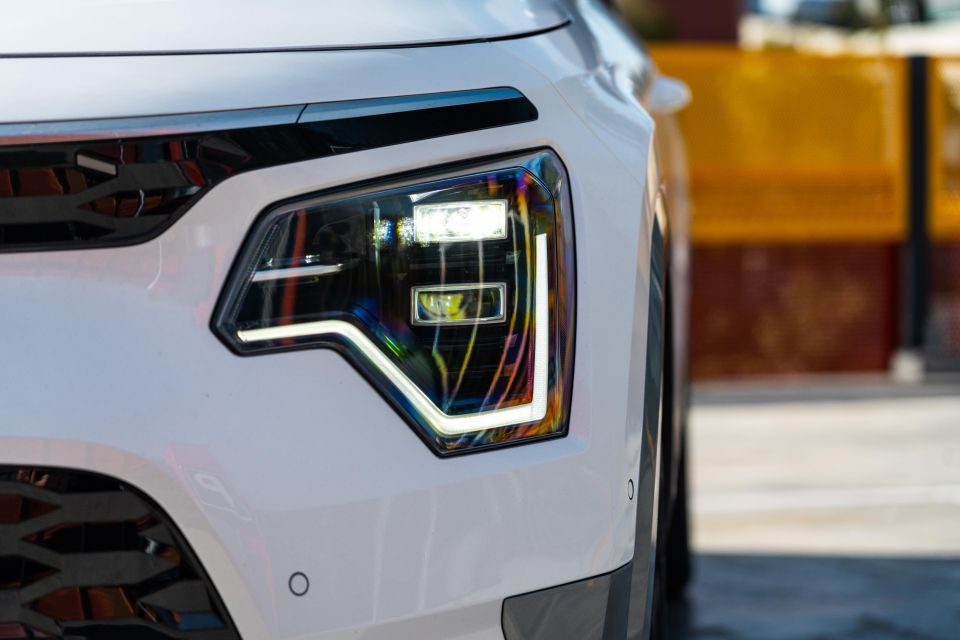

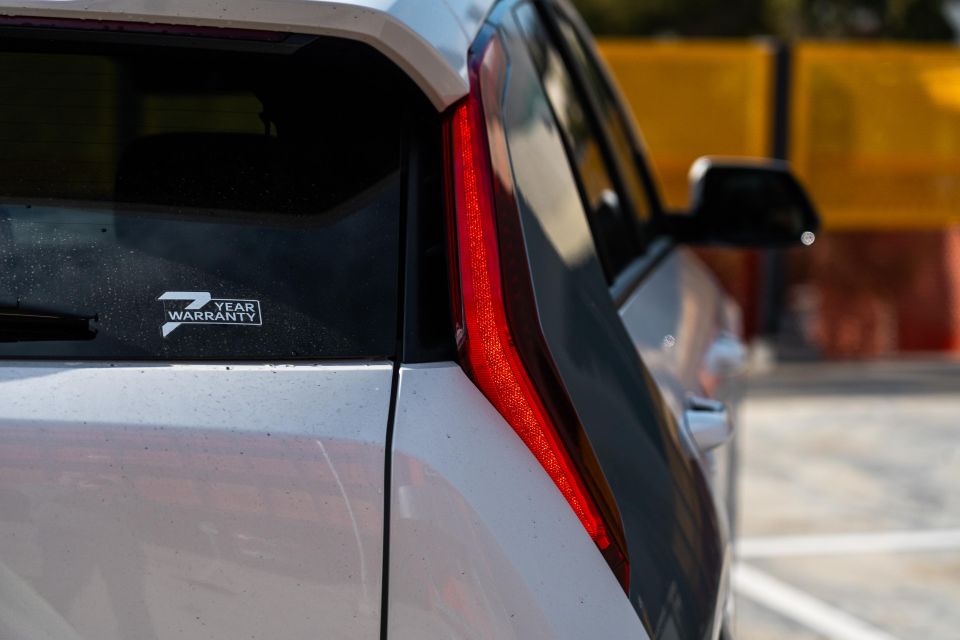

Find out more about the car
Niro EV S highlights:
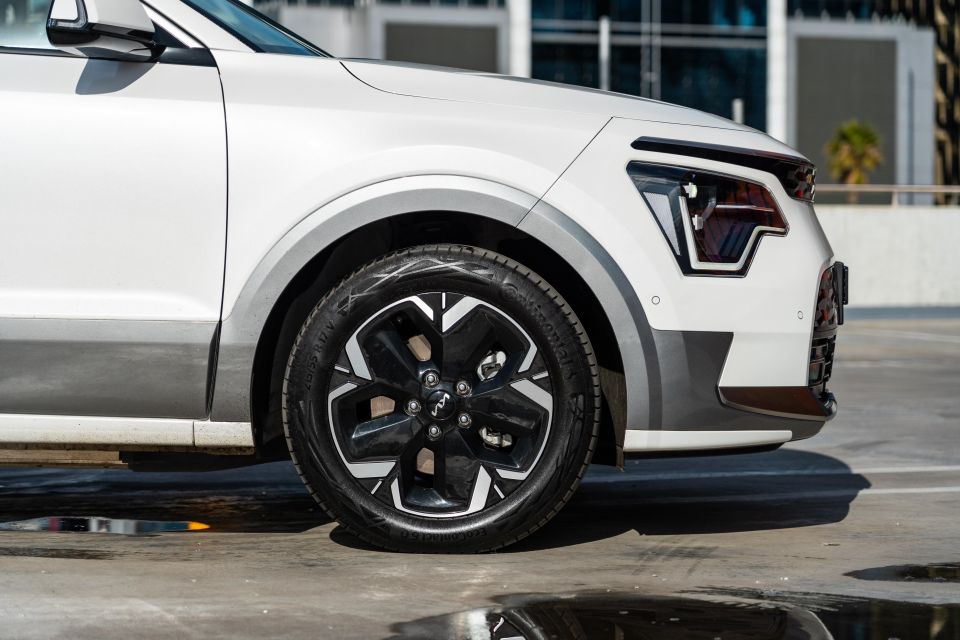

Niro EV GT-Line adds:
The Kia Niro EV has a five-star safety rating from ANCAP, based on testing conducted in 2022.
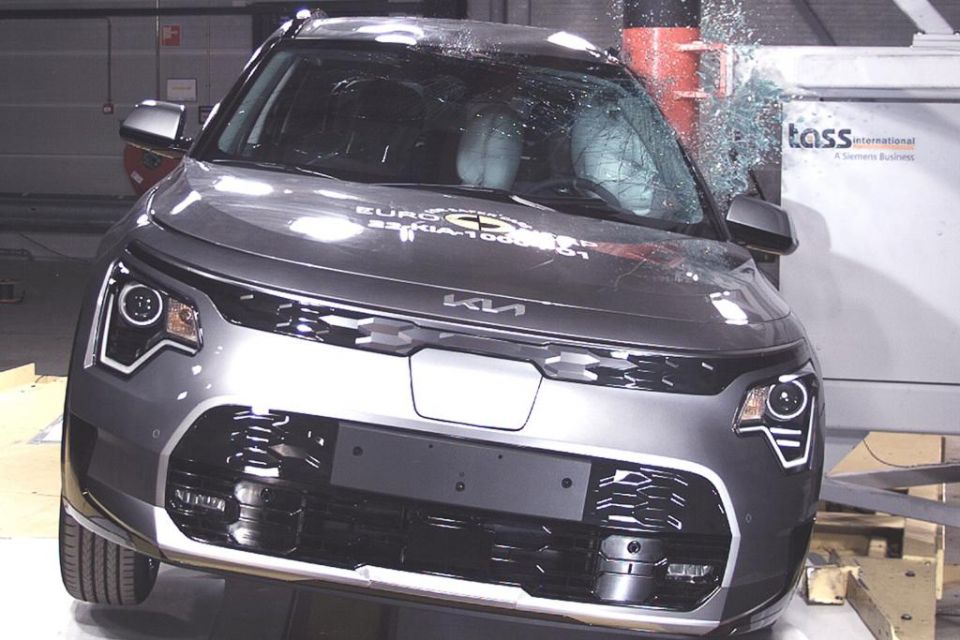
It received an adult occupant protection rating of 88 per cent, a child occupant protection rating of 84 per cent, a vulnerable road user protection rating of 76 per cent, and a safety assist rating of 87 per cent.
Standard safety equipment on the Niro EV S includes:
Niro GT-Line adds:
The Kia Niro EV is backed by a seven-year, unlimited-kilometre vehicle warranty and a seven-year, 150,000km battery warranty.
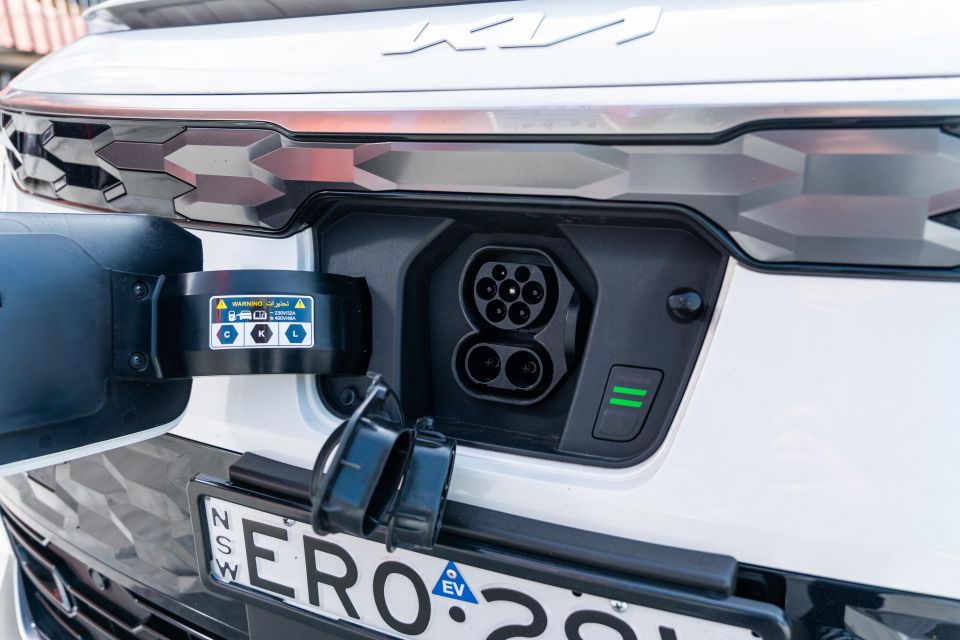
Kia offers three-, five- and seven-year pre-paid service plans, priced at $706, $1351 and $1997, respectively. While that’s on par with the likes of the BYD Atto 3, it’s a more conventional, ICE-like approach to maintenance than Tesla.
The American brand doesn’t specify servicing intervals for its Model Y and only specifies some items that need to be replaced every 2-4 years like cabin air filters.
The Kia Niro is one of those vehicles that leaves little lasting impression.
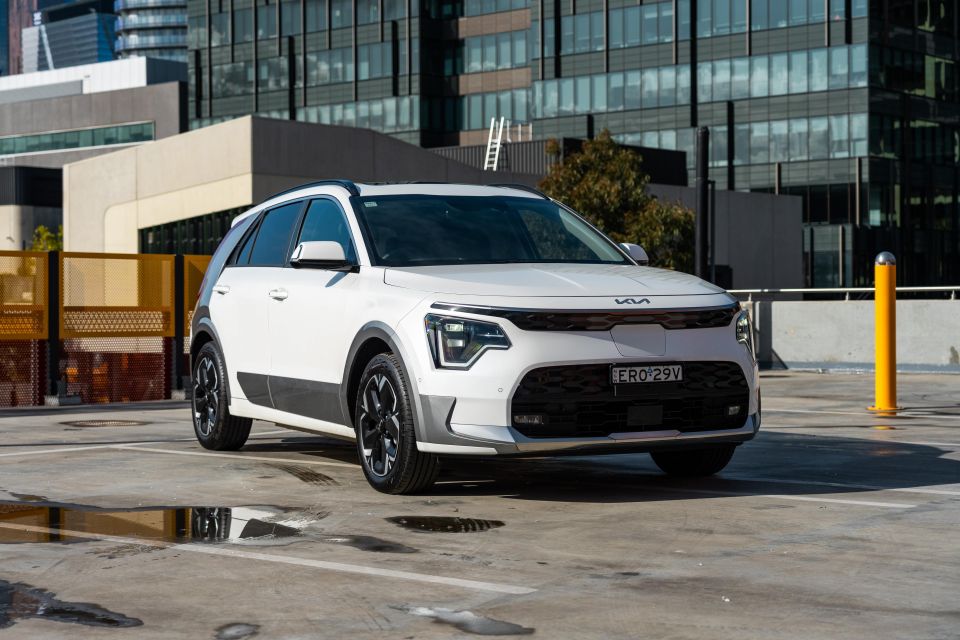
That’s not necessarily a bad thing. In fact, its high level of all-round competence means there are few flaws that linger in one’s memory.
But it’s also not terribly exciting, and at over $70,000 and facing some tough competition, it ought to have a little bit more pizazz. It doesn’t feel cheap, but it doesn’t feel like a $70,000 car, either.
It’s hard to put one’s finger on just what’s missing here. It’s quick enough, handles and rides well enough, and has a decent amount of interior room.
It’s also more interesting to look at than the last Niro, which was exceedingly conservative. There are distinctive angular lighting elements, plus the unusual colour-contrast C-pillar trim is like nothing else out there.
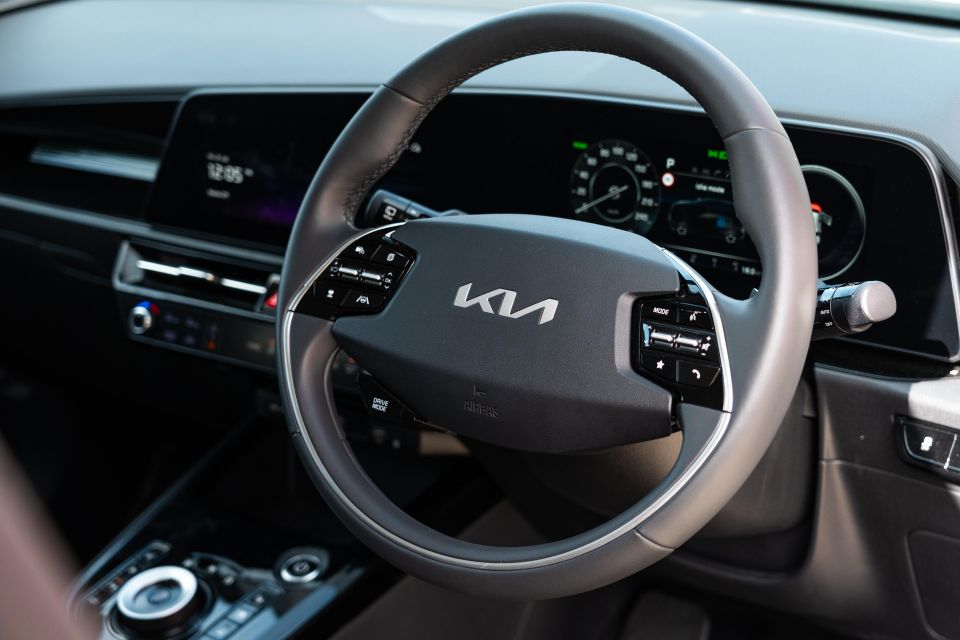
And yet it doesn’t have quite the visual impact overall of the upcoming EV5. With potentially sharp pricing for that model plus stronger supply, the Niro is likely to recede even further into the background.
It’s also hard to ignore the elephant in the room: the rather elephantine-looking Tesla Model Y, which is not only Australia’s best-selling EV, but one of the market’s best sellers, period.
It can’t match some of the luxury items of the Niro, but it offers more space and slick technology of its own. The Niro’s lofty price tag also pushes it up close to rivals from luxury brands like the BMW iX1.
It’s not a bad car by any stretch, but it’s in an uncomfortable, precarious position that can only be remedied with some price cuts.
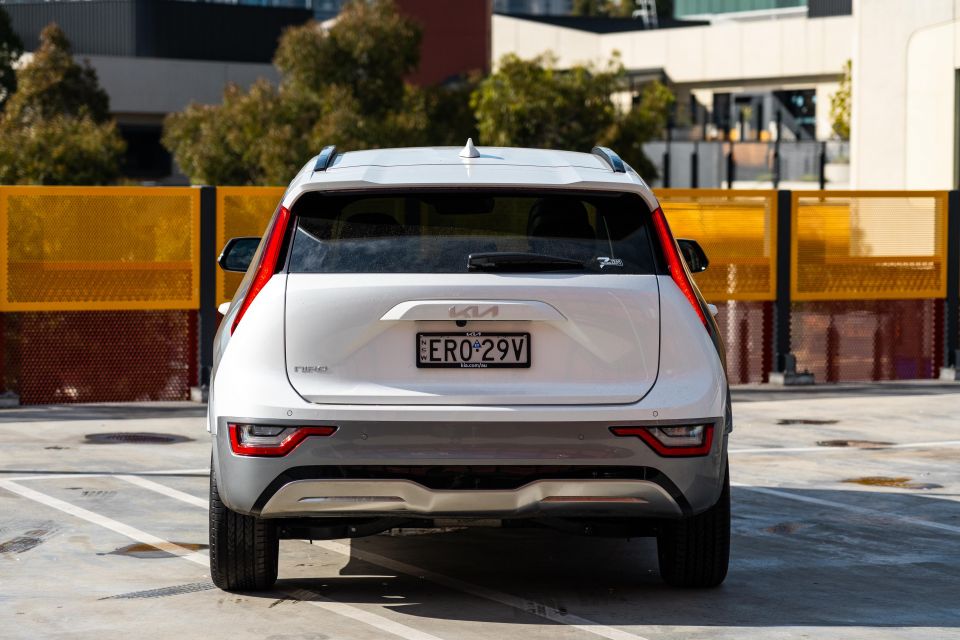
Click the images for the full gallery
MORE: Buy a Kia Niro MORE: Everything Kia Niro
Take advantage of Australia's BIGGEST new car website to find a great deal on a Kia Niro.
William Stopford is an automotive journalist based in Brisbane, Australia. William is a Business/Journalism graduate from the Queensland University of Technology who loves to travel, briefly lived in the US, and has a particular interest in the American car industry.


Max Davies
4 Days Ago
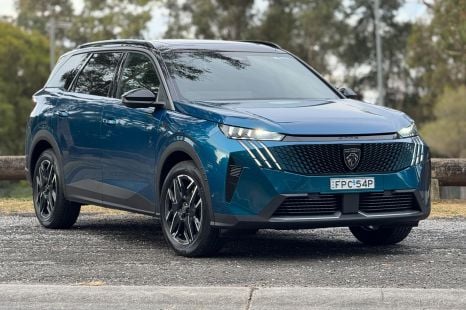

Matt Campbell
3 Days Ago
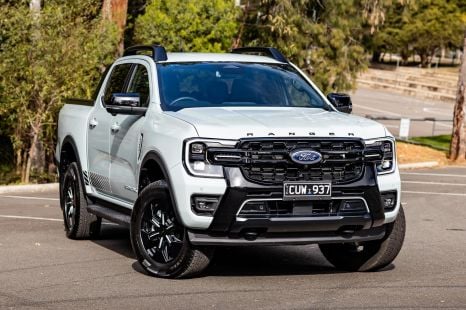

Matt Campbell
2 Days Ago
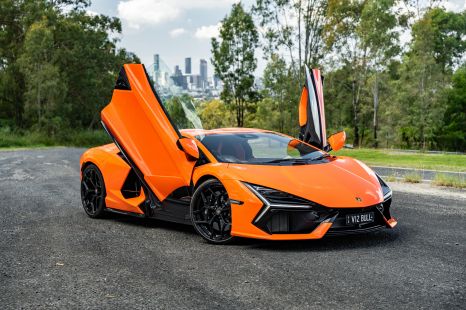

Alborz Fallah
2 Days Ago
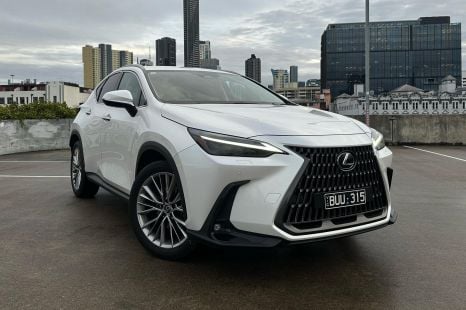

William Stopford
1 Day Ago
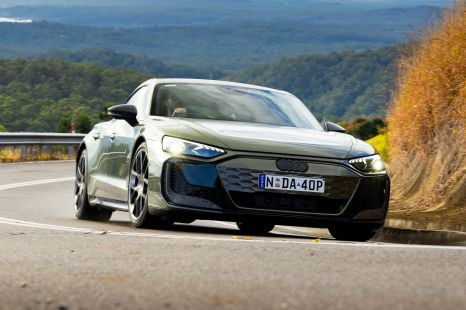

James Wong
24 Hours Ago